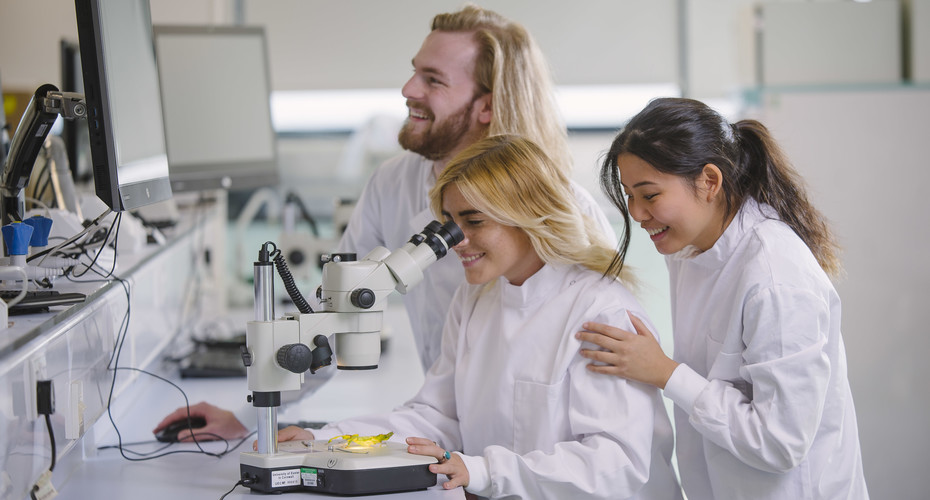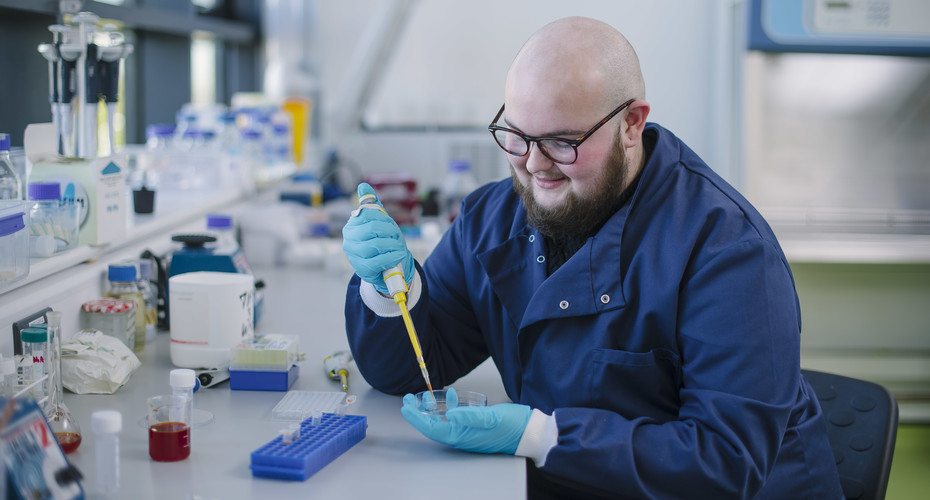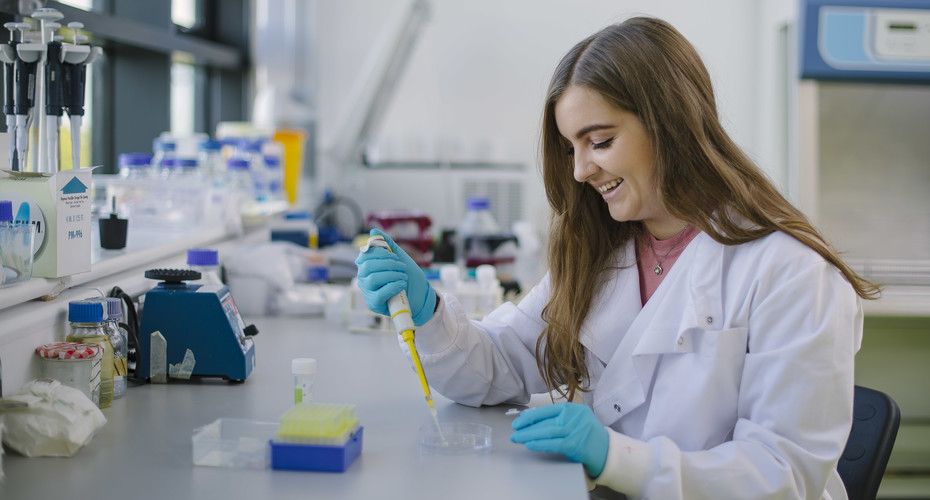| UCAS code | 1234 |
|---|---|
| Duration | 12 months full time |
| Entry year | 2024 |
| Campus | Penryn Campus |
| Discipline | Ecology and Conservation |
| Contact |
| Typical offer | Normally at least a 2:1 Honours degree or equivalent in a relevant science subject |
|---|---|
Overview
- Develop an understanding of the importance of the evolutionary processes that underlie environmental microbiology and pathogen infections
- Gain extensive and interdisciplinary training in core skills ranging from molecular to evolutionary aspects of environmental microbiology
- Learn from leading international researchers in Biosciences, Medicine and Health
- Graduate with the key skills for a career in microbiological research
- Our excellent facilities include fully equipped safety level 2 microbiology laboratories, molecular, genetics and biochemical research facilities, a full range of microscopy equipment, and controlled environment rooms
![]()
Top 10 in the world for Ecology
9th in the ShanghaiRankings Global Ranking of Academic Subjects 2022
![]()
Top 20 in the UK for world-leading research in Biological Sciences
REF 2021, based on 4-star research
![]()
Academics with exceptionally strong research profiles and a world-class reputation
Entry requirements
Normally at least a 2:1 Honours degree or equivalent in a relevant subject is required, although a 2:2 with relevant experience will be considered.
Relevant subjects include: Biological Sciences, Cell Biology, Ecology, Ecology and Conservation, Evolutionary Biology, Genetics, Marine Biology, Molecular Biology, Microbiology, Plant Science, Zoology.
Entry requirements for international students
English language requirements
International students need to show they have the required level of English language to study this course. The required test scores for this course fall under Profile B2. Please visit our English language requirements page to view the required test scores and equivalencies from your country.
Course content
The modules we outline here provide examples of what you can expect to learn on this degree course based on recent academic teaching. The precise modules available to you in future years may vary depending on staff availability and research interests, new topics of study, timetabling and student demand.
I am the Programme Director and an Associate Professor in the Department of Ecology and Conservation. I am interested in host-parasite interactions, and have worked on various different model systems to tackle questions that are broadly related to how parasites manipulate their hosts (from behavioural to immune responses) and how hosts counteracts these processes.
Amongst other things, I study how and when bacteria use an adaptive immune response (CRISPR-Cas) to defend themselves against phages, and how phages manage to counteract the CRISPR-Cas immune response in bacterial hosts. My lab also develops new approaches to fight infections with bacterial pathogens. This includes studying the potential to use bacteriophages to kill pathogenic bacteria, and how we can use CRISPR-Cas systems to remove antimicrobial resistance (AMR) genes from microbial communities, such as those in our gut.
Read more from Dr Stineke van Houte
Dr Stineke van Houte
Programme Director
Fees
2024/25 entry
UK fees per year:
£13,700 full-time; £6,850 part-time
International fees per year:
£27,500 full-time; £13,750 part-time
Scholarships
We invest heavily in scholarships for talented prospective Masters students. This includes over £5 million in scholarships for international students, such as our Global Excellence Scholarships*.
For more information on scholarships, please visit our scholarships and bursaries page.
*Selected programmes only. Please see the Terms and Conditions for each scheme for further details.
Teaching and research

How will I learn?
- Lectures
- Seminars
- Workshops
- Group discussion
- Independent study
Research project
You will gain hands-on experience of conducting cutting-edge scientific research under the guidance of professional researchers. This involves conducting an independent research project on a subject of your choice related to the biology, ecology and/or evolution of pathogens and other microbes, and molecular and evolutionary aspects of host-pathogen interactions. You will be responsible for designing, planning and implementing the study, as well as analysing the data.
You will write up your project dissertation for a world-class peer-reviewed academic journal, and present your research findings to your peers and the research group in which you’ve conducted your project. As such, this project provides valuable experience of managing an original scientific research project, from its inception through to completion.
Facilities
Depending on the exact topic of your research project, you will have access to a wide range of state-of-the-art facilities to support your research project.
These include fully equipped safety level 2 microbiology laboratories, fluorescence microscopes, a fluorescence-activated cell sorter (FACS), tissue culture, protein purification system, climate-controlled rooms, a sequencing service, and molecular biological and biochemistry facilities.
Tutorial support
You will be allocated a personal tutor who is available for advice and support throughout your studies. There is also a postgraduate tutor available to help with further guidance and advice. In addition, the programme director will offer every student a meeting each term to review academic progress.
Assessment
Taught modules are assessed through essay examinations, individual and group-based coursework assignments, oral presentations, in-module tests and reports or essays. The research project makes up a significant proportion of the assessment and is based on the dissertation write up and oral presentation.
Careers

Employer-valued skills this course develops
This programme will provide you with a diversity of skills that will equip you for a range of sectors of work but it will particularly prepare you for PhD study or a career in research.
Graduate attributes include:
- project and experimental design
- strong laboratory techniques
- scientific writing
- public speaking and communication skills
Beyond academia, graduates will be well placed to gain employment in governmental organisations (e.g. DEFRA and Public Health England), both in the UK and internationally, in medical research laboratories and the NHS, and in industry (e.g. scientific advisory and scientific officer positions in pharmaceutical, food chain, biotech and agrifood businesses). The Department has strong contacts in all these sectors and supports graduate opportunities through these links.
Careers services
Our careers teams at the Career Zone can help guide you through a wealth of information to match your skills and interests to a career that will suit you. Our staff work with regional, national and international employers to develop new work placement, project and graduate opportunities.
Graduate School of Environment and Sustainability
You will become part of Exeter's Graduate School of Environment & Sustainability - a vibrant and supportive postgraduate community based here on our Penryn campus in Cornwall. The Graduate School brings together experts from across the spectrum of earth and life sciences, engineering, humanities, social sciences and business. You will interact with students from other MScs and have the opportunity to explore issues from a range of perspectives, benefiting from a truly interdisciplinary experience. All our programmes are designed with a focus on developing solutions to global challenges and creating a better future for our planet and its people.












